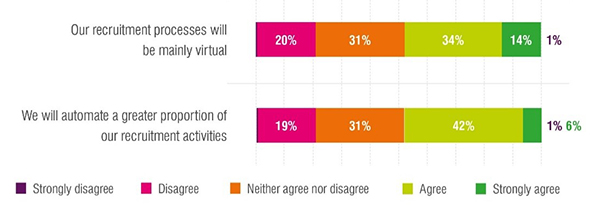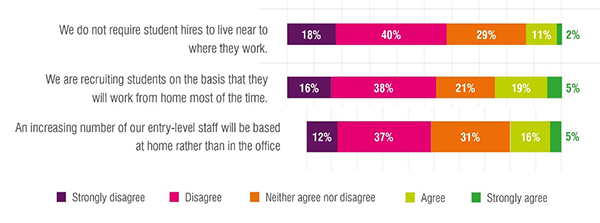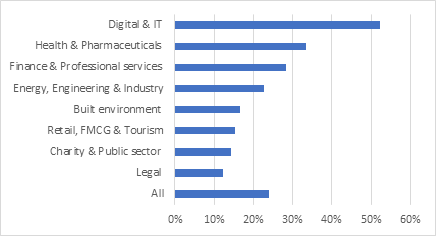ISE researcher Holly Hussein investigates whether the changes to ways of working during the pandemic are likely to stick around.
Following the announcement of the requirement to work from home at the start of the pandemic, companies have learnt to successfully work, recruit and induct new staff entirely remotely.
The initial switch may have taken some getting used to, but now that the infrastructure is in place employers are considering whether to make this more permanent, return to ‘normal’ ways of working or stay somewhere in between.
ISE’s annual Student Recruitment Survey 2021 provides some insight.
Virtual recruitment
In September, when survey responses were submitted, almost all (93%) of employers were still using mostly virtual recruitment methods.
Obviously, this was a necessity during the Covid-19 lockdowns of last year, but it seems like many employers have continued to take this approach for the 2021/22 recruitment cycle while the environment remains uncertain.
Interestingly, despite this, recruitment budgets have increased with the average cost per hire rising from £4,794 to £5,325.
Virtual recruitment seems to be effective in yielding similar results to the traditional methods, with only 14% of employers believing that the pandemic has made it harder to find quality candidates.

It is likely that as we, hopefully, move further out of the pandemic, more companies will revert to their pre-pandemic approaches, however almost half (48%) think that their recruitment processes will still be mainly virtual in the next five years. This was most common in the Finance & Professional Services (69%), Digital and IT (60%) and Energy, Engineering & Industry (60%) sectors.
Potential benefits of sticking with virtual recruitment are cited as financial and time saving and the ability to level the playing field by breaking geographical barriers. Automation is also expected to play a larger role in recruitment moving forwards.

Homeworking
Almost a quarter (24%) of employers are recruiting students who will be working from home more often than they come into the office.
Some companies (13%) are going as far to say that employees don’t even need to live near to where they work, suggesting that they would work either entirely virtually or meet face to face on a very occasional basis.
Looking to the future, this is expected to increase further with 21% of respondents believing that a larger proportion of their entry-level staff will be hired as home-workers.

There are quite apparent sectoral differences in attitudes to homeworking, however. In the Digital & IT sector, more than half (52%) of employers reported hiring students who will work from home more often than in the office – potentially due to the types of roles in these companies being easier to carry out remotely. The legal sector appeared to be least willing to adopt remote working with only 12% of organisations recruiting home-working students.
Proportion of employers hiring students who will work from home predominately by sector

We will continue to monitor and report the trends around new ways of working to see how things evolve.
Despite the move to remote working during the pandemic being a success, concerns have been raised about this becoming the norm, particularly about how it could hinder new starters.
Without the opportunity to meet colleagues face to face and build a network, some feel that career progression could be compromised. Therefore, those considering sticking with homeworking should ensure that they have put processes in place to overcome the challenges.


0 Comments